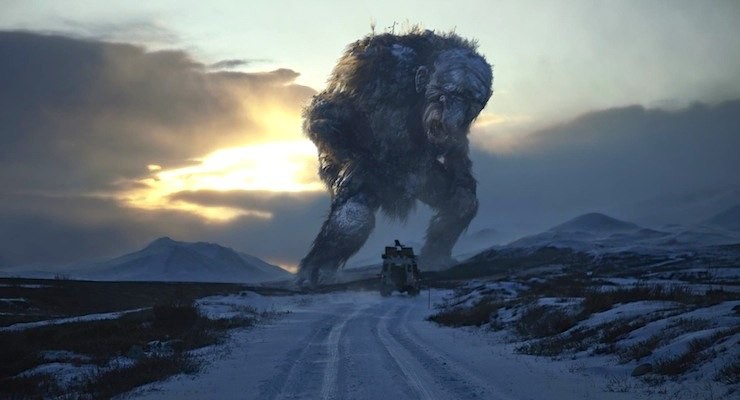It’s that time of the year again. There’s a slight chill to the late summer evenings. Leaves are starting to bring out their fall colors. Each day is just a bit shorter than the last. We can all feel what these changes signify. No, not going back to school, but that it’s the season for monster movies! Between now and Halloween I’ll be highlighting ten of the best toothy, sharp-clawed, and mutated aberrations to shred the silver screen. Some are old classics, others are newcomers, but all are awesome.
“Fairy tales are for kids. Trolls are animals. Predators. They eat, shit, and mate. Eat anything they can.” Let’s talk about the Tosserlad from Troll Hunter.
Much like the space bugs in the last Monster Mixtape entry, the trolls of the 2010 Norwegian found footage film offer plenty of options to discuss. There’s the grouchy Ringlefinch, the quarrelsome Dovregubben, and, of course, the immense and ailing Jotnar that seems as tall as the mountains it lives inside. They’ve all got their own habits and haunts in the frigid landscape. But among this shaggy lot, I think the first troll we get a good look at might be my favorite—the Tusseladd.
Most of the monsters I’m going to mention in this series had to be invented for film. And given that disbelief must always be suspended, many of the creatures either come from space or are wrapped in science lab jargon. But the trolls are different. They’re part of the cultural DNA of Scandinavia, so much so that the film’s running gag about trolls being able to smell the blood of Christians is a real snippet from the fairy tales written about them. As government-appointed troll hunter Hans (played by Otto Jespersen) tells that crew of college film students following him around, however, the creatures he’s sent to dispatch aren’t the sort Norwegian children hear about at their grandparent’s knees.
Rather than being a trickster trying to entice unwary humans to come to its forest hut to be forced into a lifetime of chores, the Tusseladd is little more than an enormous animal that has been causing too much of a ruckus. The troll is described the same way as the United States’ Wildlife Services views predators—as a nuisance to be quietly controlled and exterminated. Not that the Tusseladd is as easy to eliminate as a troublesome bear or coyote. The troll stands as tall as the trees, appears to have three heads (I’ll get to that in a second), and can only be brought down with special UV lights wielded by Hans.
What makes the Tusseladd and the other trolls remarkable in the annals of cinematic creatures, however, is the quieter discussions Hans and a helpful veterinarian have with the college students about what’s really going on in the forests and mountains of Norway. We learn that trolls are mammals, the physiology of why they’re so sensitive to sunlight, and (as the Norwegians might say, spoilere!) they can get rabies. And talking about the Tosserlad in particular, Hans casually notes that the trolls two side heads aren’t really heads at all, but weird protuberances that male trolls use to scare off rivals and attract females.
The trolls aren’t the strangest or most vicious of movie monsters. But they have a solid spot on this list because director André Øvredal put some careful thought into the consequences of having monstrous beings stomping around our forests. If such creatures had always existed as our own species started to wander into the woods, the trolls would likely fall into the category of the wolves, mountain lions, and other creatures we’ve consistently come into conflict with. The way the film brings the trolls into our world is what makes the moments spent with them so tense. If only the monsters didn’t create so much paperwork!
Brian Switek is the author of My Beloved Brontosaurus (out in paperback from Scientific American/Farrar, Straus and Giroux) and Written in Stone. He also writes the National Geographic blog Laelaps.











